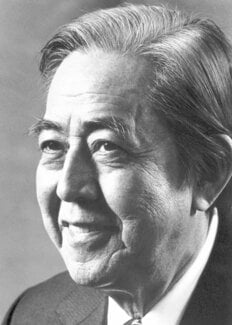Eisaku Satō
Biographical

Eisaku Satō was born on March 27, 1901 in Tabuse, Yamaguchi Prefecture, Japan.
In 1921, completing the course of senior high school, he entered Tokyo Imperial University (now Tokyo University) and majored in German jurisprudence.
In 1923, he passed the senior civil service examinations, and in the following year, upon graduating from the University, he joined the Ministry of Railways. In the Ministry, he held various important posts, such as Director of the Osaka Railways Bureau from 1944 to 1946 and Vice-Minister for Transportation from 1947 to 1948.
He married Hiroko Satō on February 23, 1926 and has two sons, Ryutaro and Shinji.
His hobbies include golf, fishing, and performing the traditional Japanese tea ceremony (chanoyu) with his wife.
His first contact with the political world was on his appointment to the post of Chief Cabinet Secretary of the second Yoshida Cabinet in 1948.
In 1949, he was elected to the House of Representatives and since then he has held the following Government and Party posts:
| Feb. 1949-April 1950 | Chairman of the Policy Affairs Research Council of the Liberal Party |
| April 1950-May 1951 Jan. 1953-July 1954 | Secretary General of the Liberal Party |
| July 1951 – July 1952 | Minister of Postal Services and Telecommunications |
| Oct. 1952-Feb. 1953 | Minister of Construction and concurrently Minister of State in charge of Hokkaido Development |
| Dec.1957-June 1958 | Chairman of the Executive Council of the Liberal Democratic Party |
| June 1958-July 1960 | Minister of Finance |
| July 1961-July 1962 | Minister of International Trade and Industry |
| July 1963-June 1964 | Minister of State in charge of Hokkaido Development and concurrently Minister of State in charge of Science and Technology; Minister of State in charge of the 18th Olympic Games |
| Dec.1964-June 1972 | President of the Liberal Democratic Party and Prime Minister. |
Eisaku Satō died in Tokyo on June 3, 1975.
Selected Bibliography
By Satō
In Quest of Peace and Freedom. Tokyo: Japan Times, 1973 (Speeches collected and translated to support his candidacy for the prize).
Other Sources
Nakamura, Koji. “Sato: A Prize Choice for the Sniggers”. Far Eastern Economic Review 86 (1 November 1974): 14. (A highly critical view.)
Obituary. New York Times (3 June 1975) 1:36.
Reischauer, Edwin O. advisory ed. Japan. The Great Contemporary Issues series. New York: Arno Press, 1974. (Articles from the New York Times. See especially pp. 358-62 and passim.)
“Sato, Eisaku”. In CB, 1965.
This autobiography/biography was written at the time of the award and first published in the book series Les Prix Nobel. It was later edited and republished in Nobel Lectures. To cite this document, always state the source as shown above.
Nobel Prizes and laureates
Six prizes were awarded for achievements that have conferred the greatest benefit to humankind. The 14 laureates' work and discoveries range from quantum tunnelling to promoting democratic rights.
See them all presented here.
